Contents
Blackberry Asterina (Asterina) – a variety of culture, which is distinguished by sweet tasty berries and the absence of thorns on the shoots. This species is very popular with gardeners, as it is undemanding to care and growing conditions. In addition, the Asterina variety is resistant to diseases and temperature extremes, and this guarantees a stable yield of bushes even in an unfavorable season. To achieve maximum efficiency when growing this type of blackberry, it is necessary to take into account some rules of agricultural technology.
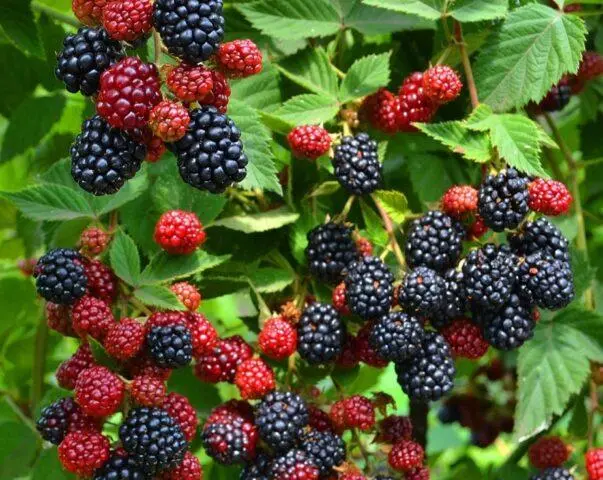
Blackberry variety Asterina has an international patent
History of breeding
This species was obtained thanks to the efforts of the Swiss breeder Peter Hauenstein. The goal of the creation was to obtain not only a variety with sweet dessert berries, but also without thorns, which would make it easier to care for the crop and harvest. And it completely succeeded.
The basis for the new species was the well-known varieties: Chester and Loch Ness. However, Asterina was able to surpass her ancestors in taste. The originator of the blackberry variety is the agricultural company Promo Fruit.
External description of the blackberry variety Asterina
This type of culture is characterized by undersized compact bushes with numerous upright shoots without thorns along the entire length. Plants are not sprawling, and caring for them is not particularly difficult. Their height reaches 2 m.
Leaf plates of the Asterin blackberry with a pointed top and serrated edges. To the touch, the plates are rough, of medium size. The color of the leaves is light green. Above-ground shoots of blackberry Asterin have a two-year life cycle.
Every year, the plant grows young pagons from dormant root buds. The following season, branching shoots appear from the axils of the upper leaves, the length of which reaches 40 cm. It is at the ends of each of them that a racemose inflorescence is formed, which is directed upwards.
The buds of the blackberry Asterin are large, when fully opened, their diameter reaches 2 cm. The petals are white. The flowers are self-pollinating, which ensures a good set of fruits even under adverse weather conditions.
The berries of this variety are large, round or oval in shape, the average weight of each is about 7 g. Initially, the fruits are reddish, but when ripe they become a uniform black shade and acquire aroma. The surface of the berries is shiny. The taste is sweet, pleasant.
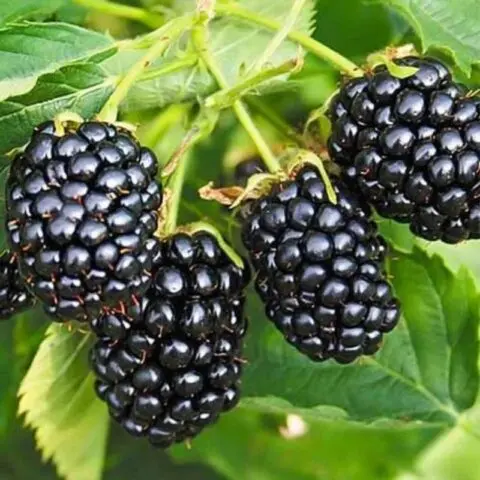
Asterin’s blackberry tasting score is 4,8 points out of a possible five
Characteristics of blackberry Asterin
Before giving preference to this variety, you need to familiarize yourself with its characteristics. This information will allow you to compare the productivity of Asterina with other types of culture. You also need to know the characteristics in order to understand what conditions are most favorable for growing this variety.
Flowering period, ripening period and yield
This variety belongs to the category of early. Blackberry Asterin blooms in early June and continues until the end of August. The first berries on it ripen in mid-July. Fruiting in Asterina is long, about two months. This feature allows you to enjoy fresh sweet berries for a long time. The yield of Asterina is consistently high. From one bush you can collect from 3 to 7 kg per season, depending on the number of fruit shoots.
Ripe fruits stay on the branches for a long time, without losing commercial qualities. Keep the harvested fresh in the refrigerator at a temperature of +2-4 ° C for 7-10 days. Also Asterina berries can be used for processing.
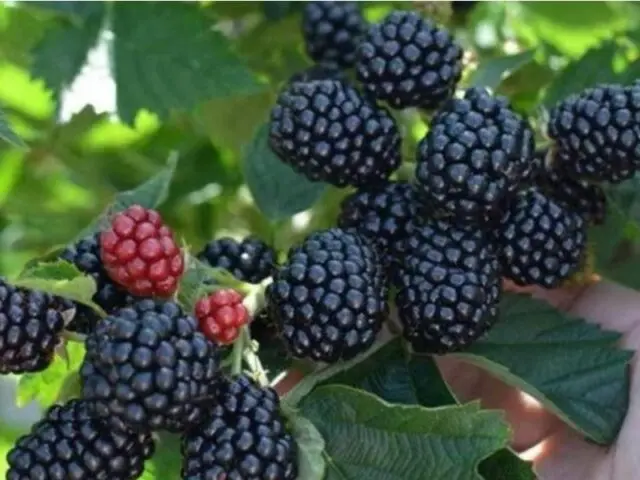
Harvest easily tolerates transportation
Frost and drought resistance
This species is adapted to hot climates and it tolerates drought well. However, with a long absence of seasonal rains, the bushes need to be watered. Irrigation is especially necessary during flowering, fruit set.
Frost resistance of blackberry Asterin is average. Bushes do not suffer from a temperature drop to -20 ° C. But when growing a variety in the central and northern regions, mandatory warming of plants for the winter is necessary.
Disease and pest resistance
Blackberry Asterina has a high natural immunity. It is not susceptible to diseases such as rust, white spot, gray rot, powdery mildew. However, Asterina may suffer from anthracnose. Therefore, experienced gardeners recommend not neglecting preventive treatments with fungicides during the growing season.
If the growing conditions and improper care are not met, the Asterin blackberry can be affected by pests. Among them are spider mites, weevil, kidney moths, aphids, moths and glass cases.
In the event of the appearance of alarming signs, it is necessary to treat the bushes with acaricides and insecticides, but you should remember about the waiting period before harvesting.
Advantages and disadvantages of the variety
Asterina, like other blackberry varieties, has strengths and weaknesses. Therefore, it is necessary to familiarize yourself with them in advance.
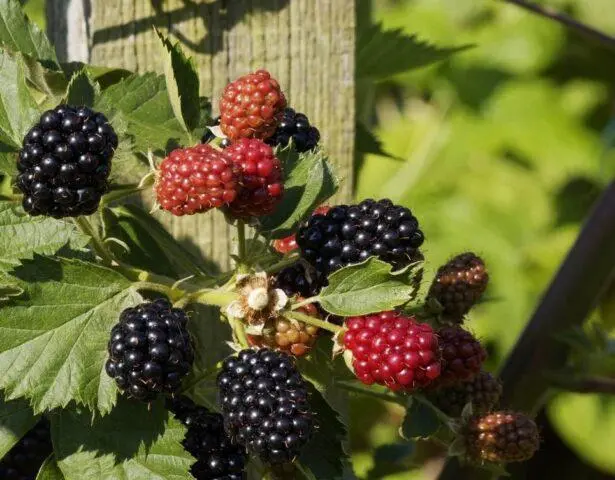
Asterina begins to bear fruit in the second year after planting.
Advantages:
- early ripening;
- compactness of bushes;
- high resistance to diseases;
- excellent taste;
- high yield;
- unpretentiousness to care;
- versatility of application;
- absence of thorns on the shoots.
Disadvantages:
- not suitable for commercial cultivation;
- the variety is susceptible to anthracnose;
- requires tying to a support.
Features of landing
For the successful cultivation of Asterin blackberries and high yields, it is necessary to properly plant the bushes, taking into account the basic requirements of the culture.
Blackberries will develop well and bear fruit abundantly in sandy and loamy soil. It is important that the soil has good aeration, and its acidity level is 6 pH.
For seedlings, you should choose an open area, protected from cold gusts of wind. Light shading during the midday hours is also acceptable. Holes should be prepared two weeks before planting. They should have a size of 40 by 40 cm. A layer of drainage 5 cm thick should be placed at the bottom of the recess, and the rest of the volume should be filled with nutrient mixture.
It should include:
- 2 part of the turf;
- 1 part humus;
- 1 part peat;
- 1 part of the sand;
- 1 part of leaf land.
Also, in addition, 40 g of superphosphate and 30 g of potassium sulfide must be added to the mixture, and then mixed thoroughly.
Planting can be done in spring and autumn. For a day, seedlings should be put in water for nourishment. Plants should be planted so that their root neck is 3-4 cm above the soil surface. The distance between Asterin seedlings should be about 1 m, so that they do not subsequently compete for moisture and nutrition. After the procedure, the root circle of seedlings should be mulched with peat or humus.
Care instructions
Blackberry Asterina does not require complex care. Planted bushes should be watered regularly for the first six weeks so that they adapt and grow. For irrigation, it is recommended to use rainwater or settled water with a temperature of +18-+20 °C.
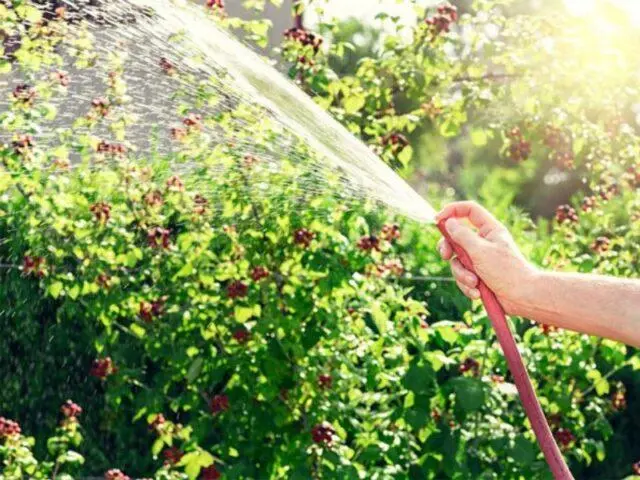
Mature bushes need watering only when there is no rain for a long time.
Feeding Asterin blackberries should begin in the second year after planting. Fertilizers should be applied during the period of active vegetation, flowering and the formation of the ovary. At the first stage, it is recommended to use organic matter or urea. Subsequently, it is necessary to use mineral mixtures with a high content of potassium and phosphorus, as well as wood ash.
This fruit shrub needs support. To do this, use a trellis 1,2-1,5 m high with two rows of wire. In the first season, all Asterin blackberry shoots must be tied up in one direction, and in the second year, young branches should be fixed in the other direction. This will separate the shoots of different ages and simplify care.
Blackberry Asterina requires regular pruning. You need to start forming bushes in the second year after planting in the spring. Before bud break, shoots should be shortened to 1,5 m to improve their branching.
The second time pruning is carried out in June to normalize the number of young shoots. You can leave 4-5 shoots per bush. For the last time in a season, Asterin’s blackberry should be cut in the fall, removing all biennial fruiting branches. Also, every spring it is necessary to clean the bushes from broken and damaged shoots.
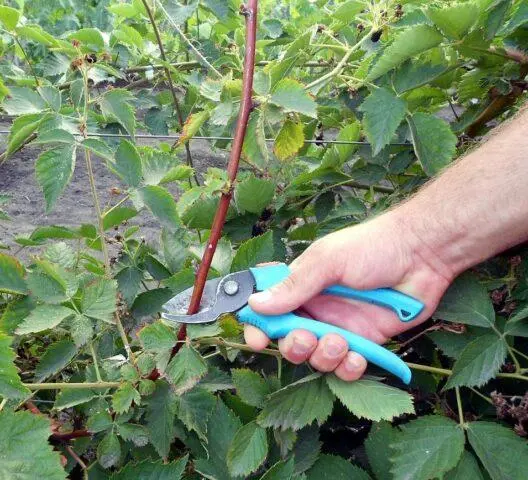
Pruning is an integral part of Asterina care
At the stage of preparation for winter, at the base of the bushes, you need to lay a mulch of peat or humus 10 cm thick, and bend the branches to the ground and insulate with agrofiber.
Conclusion
Blackberry Asterina is a variety that can adequately compete with raspberries. Indeed, in terms of the sweetness of the fruit and the beneficial properties of its berries, they are in no way inferior. In addition, this variety is undemanding to care and is able to produce a stable high yield even in adverse seasons.









